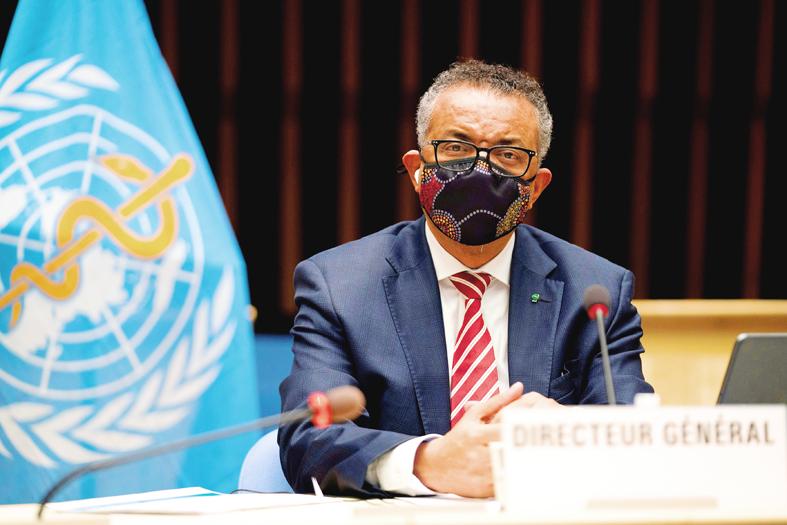COVID-19 has had a devastating impact around the globe, but the WHO on Monday warned that worse pandemics could lie ahead, urging the world to get “serious” about preparedness.
“This is a wakeup call,” WHO Health Emergencies Program executive director Michael Ryan told reporters at a briefing marking a year since the UN agency first learned of a new virus spreading in China, as well as the agency’s final briefing for the year.
Since then, COVID-19 has killed nearly 1.8 million people around the world, out of more than 80 million reported infections.

Photo: Reuters / Christopher Black / WHO
“This pandemic has been very severe,” Ryan said. “It has spread around the world extremely quickly and it has affected every corner of this planet, but this is not necessarily the big one.”
While the virus is “very transmissible, and it kills people ... its current case fatality [rate] is reasonably low in comparison to other emerging diseases,” he said. “We need to get ready for something that may even be more severe in the future.”
“The likely scenario is the virus will become another endemic virus that will remain somewhat of a threat, but a very low-level threat in the context of an effective global vaccination program,” he said.
However, “the existence of a vaccine, even at high efficacy, is no guarantee of eliminating or eradicating an infectious disease. That is a very high bar for us to be able to get over,” he said.
WHO senior adviser Bruce Aylward said that while the world had made huge scientific progress to address the current crisis, including developing vaccines at record speed, it was far from prepared to ward off future pandemics.
“We are into second and third waves of this virus and we are still not prepared to deal with and manage those,” he told the briefing. “So while we are better prepared ... we are not fully prepared for this one, let alone the next one.”
WHO Director-General Tedros Adhanom Ghebreyesus said he hoped that the COVID-19 pandemic had helped the world become more prepared to tackle future threats and hailed how scientists around the world were working closely together to help bring the pandemic to an end.
He specifically mentioned the two new strains of the virus that have emerged in the UK and South Africa, which appear to be more infectious that previous strains.
“Only if countries are looking and testing effectively will you be able to pick up variants and adjust strategies to cope,” he said. “We must ensure that countries are not punished for transparently sharing new scientific findings.”
David Heymann, an epidemiologist with the London School of Hygiene and Tropical Medicine and chair of the WHO’s strategic and technical advisory group for infectious hazards, said that “it appears the destiny of SARS-CoV-2 is to become endemic ... and continue to mutate as it reproduces in human cells, especially in areas of more intense admission.”
Additional reporting by the Guardian

ROLLER-COASTER RIDE: More than five earthquakes ranging from magnitude 4.4 to 5.5 on the Richter scale shook eastern Taiwan in rapid succession yesterday afternoon Back-to-back weather fronts are forecast to hit Taiwan this week, resulting in rain across the nation in the coming days, the Central Weather Administration said yesterday, as it also warned residents in mountainous regions to be wary of landslides and rockfalls. As the first front approached, sporadic rainfall began in central and northern parts of Taiwan yesterday, the agency said, adding that rain is forecast to intensify in those regions today, while brief showers would also affect other parts of the nation. A second weather system is forecast to arrive on Thursday, bringing additional rain to the whole nation until Sunday, it

CONDITIONAL: The PRC imposes secret requirements that the funding it provides cannot be spent in states with diplomatic relations with Taiwan, Emma Reilly said China has been bribing UN officials to obtain “special benefits” and to block funding from countries that have diplomatic ties with Taiwan, a former UN employee told the British House of Commons on Tuesday. At a House of Commons Foreign Affairs Committee hearing into “international relations within the multilateral system,” former Office of the UN High Commissioner for Human Rights (OHCHR) employee Emma Reilly said in a written statement that “Beijing paid bribes to the two successive Presidents of the [UN] General Assembly” during the two-year negotiation of the Sustainable Development Goals. Another way China exercises influence within the UN Secretariat is

LANDSLIDES POSSIBLE: The agency advised the public to avoid visiting mountainous regions due to more expected aftershocks and rainfall from a series of weather fronts A series of earthquakes over the past few days were likely aftershocks of the April 3 earthquake in Hualien County, with further aftershocks to be expected for up to a year, the Central Weather Administration (CWA) said yesterday. Based on the nation’s experience after the quake on Sept. 21, 1999, more aftershocks are possible over the next six months to a year, the agency said. A total of 103 earthquakes of magnitude 4 on the local magnitude scale or higher hit Hualien County from 5:08pm on Monday to 10:27am yesterday, with 27 of them exceeding magnitude 5. They included two, of magnitude

Taiwan’s first drag queen to compete on the internationally acclaimed RuPaul’s Drag Race, Nymphia Wind (妮妃雅), was on Friday crowned the “Next Drag Superstar.” Dressed in a sparkling banana dress, Nymphia Wind swept onto the stage for the final, and stole the show. “Taiwan this is for you,” she said right after show host RuPaul announced her as the winner. “To those who feel like they don’t belong, just remember to live fearlessly and to live their truth,” she said on stage. One of the frontrunners for the past 15 episodes, the 28-year-old breezed through to the final after weeks of showcasing her unique